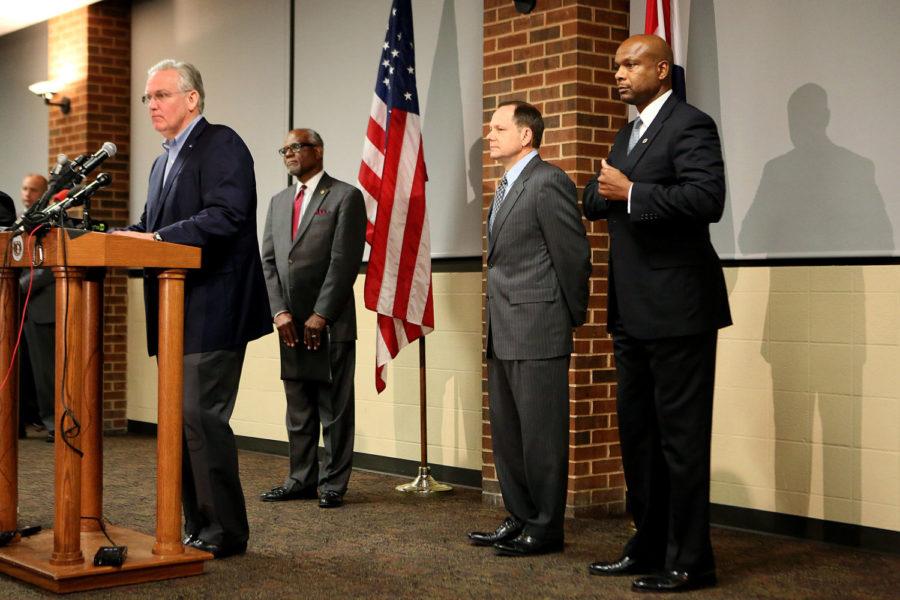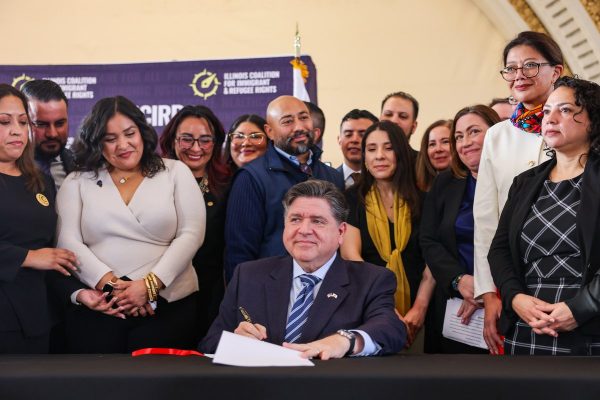No charges against Darren Wilson in Ferguson shooting, grand jury decides
Missouri Gov. Jay Nixon, St. Louis County Executive Charlie Dooley, St. Louis Mayor Francis Slay and Public Safety Director Dan Isom call for peace in anticipation of the announcement of the grand jury decision in the Darren Wilson case on Monday, Nov. 24, 2014, at the University of Missouri-St. Louis. (Huy Mach/St. Louis Post-Dispatch/TNS)
Nov 25, 2014
Last updated on May 10, 2016 at 11:34 p.m.
CLAYTON, Mo. — Officer Darren Wilson will not face state criminal charges in the killing of Michael Brown in Ferguson, Missouri.
St. Louis County Prosecuting Attorney Robert P. McCulloch announced Monday night that a grand jury delivered a “no true bill” after considering possible charges in the case, meaning an indictment will not be handed down.
A separate federal investigation into whether Wilson violated Brown’s civil rights is continuing, officials said. McCulloch said the two investigations had worked in harmony and evidence was shared with investigators from both levels of government.
“Our only goal was that our investigation would be thorough and complete,” he said.
Get The Daily Illini in your inbox!
Wilson’s shooting of the unarmed youth in a confrontation Aug. 9 triggered months of protests, and focused national concerns about policing and race on a suburban St. Louis community that had considered itself a strong example of racial harmony.
Officials, Brown’s family and some protest leaders pleaded for a peaceful reaction to news that seemed certain to anger those who called for Wilson’s arrest and immediate prosecution for murder.
Protesters began gathering in Ferguson shortly after it was announced that the grand jury had made a decision. A smaller crowd gathered in Clayton, where the announcement of the decision was made to members of the media inside a courtroom where preliminary hearings and arraignments are typically held.
McCulloch, who could have decided on his own whether to charge Wilson, chose instead to take the case to a grand jury. Its 12 members meet in secret and usually hear just a synopsis of evidence before voting on whether to issue an indictment, a legal action that results in a trial.
But in this case, the prosecutor had two assistants present all the evidence available — meaning the grand jurors heard testimony from every witness and saw every report, photograph and video before deciding. Nine of 12 votes are required for in an indictment, but the vote count remains secret.
McCulloch gave his condolences to Brown’s family at the beginning of the press conference.
He said the presentation of evidence and deliberations were done on the grand jury’s schedule. The grand jury met on 25 different days, he said.
McCulloch said some witnesses disagreed with others, and sometimes physical evidence didn’t match witness statements. Almost all the initial interviews of witnesses, including Wilson, were recorded, McCulloch said.
What is not in dispute is that Brown, 18, took a $48 package of cigarillos about noon that day from the Ferguson Market on West Florissant Avenue and had some kind of physical encounter with Wilson, 28, shortly later as the officer sat in a police SUV on Canfield Drive.
Brown’s companion, Dorian Johnson, said Wilson drove up, ordered them to stop walking in the street, then reached through the open driver’s side window and grabbed Brown by the neck to pull him in. Police said Wilson had pushed the door closed to keep Wilson from getting out of the SUV before the men struggled through the window and at least one shot was fired from the officer’s handgun.
The official autopsy indicated that Brown suffered a close-range wound to the thumb, which Wilson’s supporters took to indicate that Brown was reaching for the weapon. His blood was found on the 9mm Sig Sauer semi-automatic.
Witnesses said Brown ran from the vehicle and that Wilson tried to chase him. Some bystanders said Brown had his hands up and was shot when surrendering. Some said he was shot in the back. Sources close to Wilson said he told officials that Brown stopped and aggressively turned back toward him before he fired two volleys.
Brown was shot at least six times, with at least five wounds in the front and one that could have been from the front or back depending upon the position of his arm at the moment. A shot to the top of his head, which may have occurred while he was falling or lunging, officials said, was fatal. Toxicology showed that Brown had used marijuana.
People in the community were angered that Brown’s body lay in the street for more than four hours during the investigation, although officials have said that is not an unusually long time.
Simmering protests broke into open violence the next night, when protesters burned a Quik Trip service station and hauled merchandise from some stores along West Florissant. That led to weeks of confrontations between protesters and police who used tear gas and rubber bullets to try to keep control.
The protests have continued since.
Wilson was put on paid leave and has been in hiding. He did testify before the grand jury, an unusual step for the target of an investigation. He and Ferguson Police Chief Thomas Jackson have thus far resisted calls for them to resign, although it seemed highly unlikely that Wilson could resume duties as a Ferguson patrolman.






